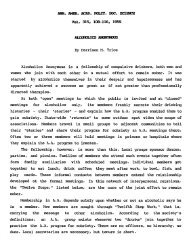with special reference to alcoholism surrender versus ... - Silkworth.net
with special reference to alcoholism surrender versus ... - Silkworth.net
with special reference to alcoholism surrender versus ... - Silkworth.net
You also want an ePaper? Increase the reach of your titles
YUMPU automatically turns print PDFs into web optimized ePapers that Google loves.
conquer reality, but lurking in his unconscious is the feeling, 'There'll come a day' -- which implies<br />
no real acceptance and demonstrates conclusively that the struggle is still going on. With<br />
submission, which at best is a superficial yielding, tension continues. When, on the other hand, the<br />
ability <strong>to</strong> accept reality functions on the unconscious level, there is no residual battle, and<br />
relaxation ensues <strong>with</strong> freedom from strain and conflict. In fact, it is perfectly possible <strong>to</strong> ascertain<br />
<strong>to</strong> what extent the acceptance of reality is on the unconscious level by the degree of relaxation<br />
which develops. The greater the relaxation, the greater is the inner acceptance of reality."<br />
Understanding Acceptance<br />
In that paragraph the words "accept" and "acceptance" are each used three times. I saw at<br />
the time that <strong>surrender</strong> leads <strong>to</strong> acceptance. What I failed <strong>to</strong> see and emphasize was the very<br />
important relationship between <strong>surrender</strong> and the capacity for acceptance.<br />
I propose, therefore, first, <strong>to</strong> consider acceptance as a human capacity, and second, <strong>to</strong> discuss<br />
the blocks <strong>to</strong> the development of acceptance. The importance of 61 acceptance" is widely<br />
recognized although often only by indirection. Sometimes the necessity for acceptance is bluntly<br />
stated, as in Grayson's4 recent article on the role of "acceptance" in physical rehabilitation.<br />
Grayson reports his discovery that the individual who needs rehabilitation remains a poor prospect<br />
until he finally accepts his need for the rehabilitating procedures. More often the concept of<br />
acceptance is dragged in by the heels <strong>with</strong> little or no recognition that acceptance itself is a major<br />
psychological step. Two recent illustrations are worthy of mention. In a summarizing article on<br />
Alcoholics Anonymous, in the Connecticut Review on Alcoholism5, the following statements appear:<br />
"He does not have <strong>to</strong> fight against ideas which come from this group, he can accept them." Thus<br />
the idea that he is an alcoholic is acceptable when coming from this group. The need <strong>to</strong> avoid the<br />
'first drink' is 44 accepted." Certainly the need for acceptance is unequivocally stated. And the<br />
following statement is from Kubie's6 book: "The man who is normal can accept the guidance of<br />
reason, reality and common sense" The word "accept" is scattered throughout the pages of the<br />
book but the question of acceptance is never raised-as if it were something that needs no<br />
discussion.<br />
The first of the Alcoholics Anonymous twelve steps reads: "We admitted we were powerless<br />
over alcohol -- that our lives had become unmanageable." The second word is "admitted," which in<br />
many ways is a blood brother of acceptance although many an A.A. meeting has been devoted <strong>to</strong><br />
quibbling about the difference between admit and accept. Time and again slips are explained on<br />
the basis that the one who slips has not truly accepted his <strong>alcoholism</strong>.<br />
The word "accept", thus, appears quite regularly in speech and writing but never is there much<br />
discussion of how acceptance comes about. The usual explanation is that, if the doc<strong>to</strong>r is accepting,<br />
the patient will be so <strong>to</strong>o; in case of failure, the therapist is held responsible, just as parents are<br />
for their children. To suppose that acceptance is caught by contagion is a pretty thought. It is not,<br />
however, likely <strong>to</strong> stimulate much understanding of individual psychodynamics. It is not enough<br />
merely <strong>to</strong> point the finger elsewhere.<br />
There is need, therefore, <strong>to</strong> discuss the dynamics of acceptance in the individual. Acceptance<br />
appears <strong>to</strong> be a state of mind in which the individual accepts rather than rejects or resists: he is<br />
able <strong>to</strong> take things in, <strong>to</strong> go along <strong>with</strong>, <strong>to</strong> cooperate, <strong>to</strong> be receptive. Contrariwise, he is not<br />
argumentative, quarrelsome, irritable or contentious. For the time being, at any rate, the hostile,<br />
negative, aggressive elements are in abeyance, and we have a much pleasanter human being <strong>to</strong><br />
deal <strong>with</strong>. Acceptance as a state of mind has many highly admirable qualities as well as useful<br />
ones. Some measure of it is greatly <strong>to</strong> be desired. Its attainment as an inner state of mind is<br />
never easy.<br />
It is necessary <strong>to</strong> point out that no one can tell himself or force himself wholeheartedly <strong>to</strong><br />
accept anything. One must have a feeling -conviction -otherwise' the acceptance is not<br />
wholehearted but halfhearted <strong>with</strong> a large element of lip service. There is a string of words which<br />
describe halfhearted acceptance: submission, resignation, yielding, compliance, acknowledgment,<br />
concession, and so forth. With each of these words there is a feeling of reservation, a tug in the<br />
direction of nonacceptance.















